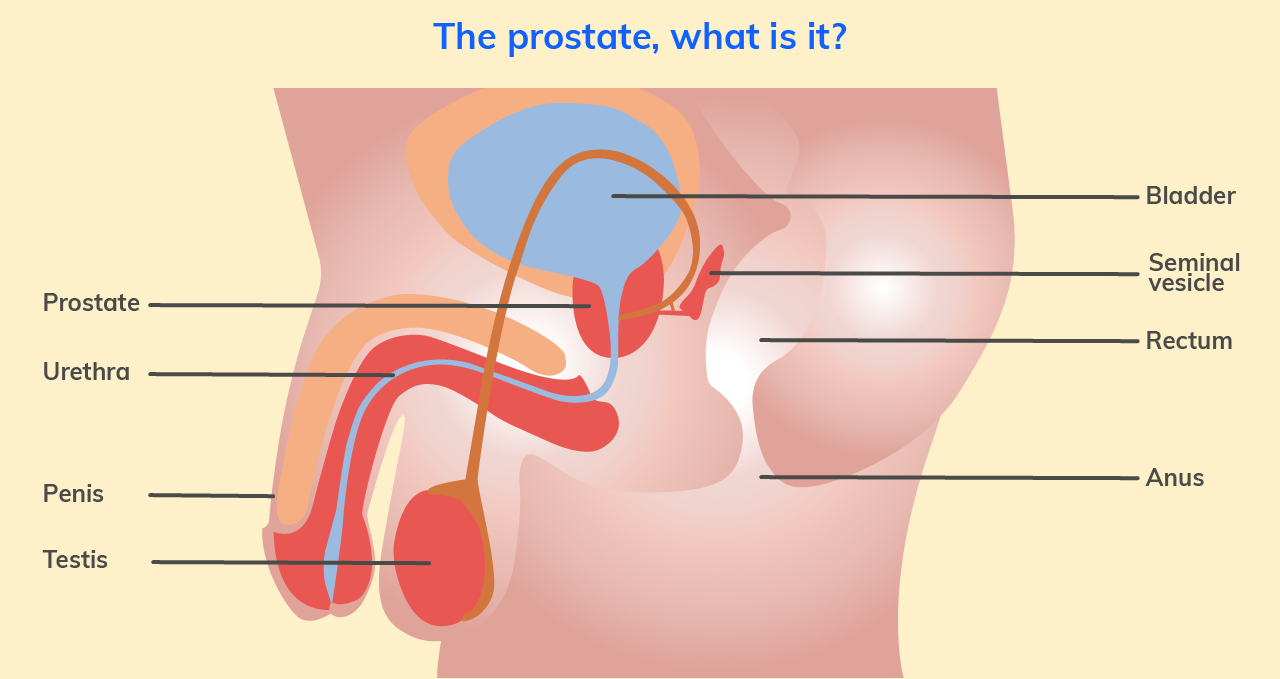What is the prostate?
The prostate is a walnut-shaped gland located beneath the bladder. It surrounds the urethra and gets larger with age. The main function of the prostate is the creation of semen – the fluid that carries sperm.

What are the common prostate-related problems and what are the symptoms?
The most common prostate problems are an enlarged prostate, prostatitis and prostate cancer. When prostate cancer is contained within the prostate (localised or early prostate cancer), there aren’t usually any symptoms. However, some men may experience some issues while peeing.
How widespread is prostate cancer?
Prostate cancer is the most common cancer among men in the UK, accounting for over a quarter of all new cancer cases. 1 in 8 men in the UK will be diagnosed with prostate cancer at some point in their lifetime.
Prostate cancer usually affects men over 50, and the risk of incidence increases with age. The risk is significantly higher for black men and men with a family history of prostate cancer.
How do you test the health of the prostate?
There are four main methods used to examine the prostate:
- PSA (prostate-specific antigen) test
- DRE (digital rectal exam)
- Biopsy
- Scans (e.g. MRI, CT)
What is PSA?
Prostate-specific antigen (PSA) is a protein produced by both cancerous (malignant) and noncancerous (benign) prostate tissue. A small amount of PSA normally enters the bloodstream. However, cancerous cells usually produce more PSA than normal cells.
An increased level of PSA in the blood can be a possible indicator of cancer. However, raised PSA levels can also be present in other, non-cancerous prostate conditions.
What is a PSA test?
The Newfoundland PSA Test measures the amount of PSA in your blood. However, although an increased PSA level can be a sign of prostate cancer, a diagnosis of prostate cancer is not made on a PSA level alone, as other factors such as the size of the prostate gland and the rate in change of PSA levels are also taken into account.
If you're having a PSA test, you should not have:
- Ejaculated in the past 48 hours
- Exercised heavily in the past 48 hours
- A urinary infection
- Had a prostate biopsy in the past 6 weeks
Why is PSA testing controversial and is there a screening programme?
PSA testing is a hotly debated topic among medical circles. This is because elevated PSA levels are also associated with certain benign conditions, where no treatment is necessary, while a small number of prostate cancer cases are not accompanied by a rise in PSA levels.
Nonetheless, PSA testing has proved effective at reducing the chances of dying from prostate cancer, and has the following advantages:
- Detects prostate cancer early before symptoms emerge
- Detects fast-growing cancer at early stage, allowing treatment before it spreads further
- Regular PSA testing tracks unexpected changes in levels
Currently there is no national screening programme for prostate cancer. However, men over 50 are entitled to a PSA test if they ask their GP. In conclusion, while it’s important to understand the shortcomings of the PSA test, regular PSA testing can prove extremely useful in detecting unexpected changes in prostate levels and as an indicator of a wide range of prostate conditions.